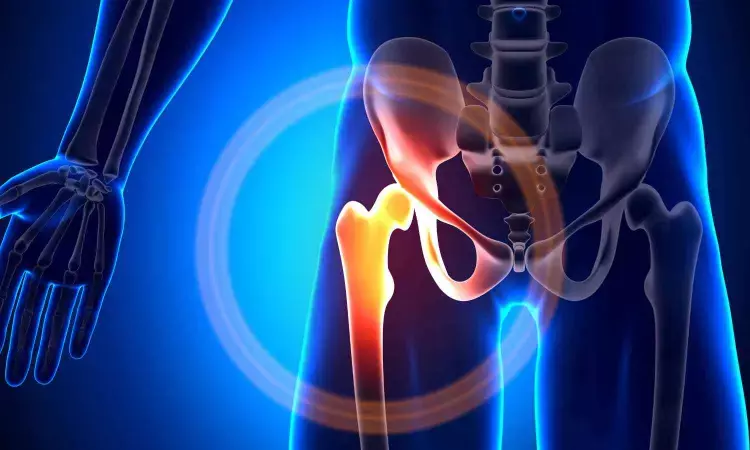- Home
- Medical news & Guidelines
- Anesthesiology
- Cardiology and CTVS
- Critical Care
- Dentistry
- Dermatology
- Diabetes and Endocrinology
- ENT
- Gastroenterology
- Medicine
- Nephrology
- Neurology
- Obstretics-Gynaecology
- Oncology
- Ophthalmology
- Orthopaedics
- Pediatrics-Neonatology
- Psychiatry
- Pulmonology
- Radiology
- Surgery
- Urology
- Laboratory Medicine
- Diet
- Nursing
- Paramedical
- Physiotherapy
- Health news
- Fact Check
- Bone Health Fact Check
- Brain Health Fact Check
- Cancer Related Fact Check
- Child Care Fact Check
- Dental and oral health fact check
- Diabetes and metabolic health fact check
- Diet and Nutrition Fact Check
- Eye and ENT Care Fact Check
- Fitness fact check
- Gut health fact check
- Heart health fact check
- Kidney health fact check
- Medical education fact check
- Men's health fact check
- Respiratory fact check
- Skin and hair care fact check
- Vaccine and Immunization fact check
- Women's health fact check
- AYUSH
- State News
- Andaman and Nicobar Islands
- Andhra Pradesh
- Arunachal Pradesh
- Assam
- Bihar
- Chandigarh
- Chattisgarh
- Dadra and Nagar Haveli
- Daman and Diu
- Delhi
- Goa
- Gujarat
- Haryana
- Himachal Pradesh
- Jammu & Kashmir
- Jharkhand
- Karnataka
- Kerala
- Ladakh
- Lakshadweep
- Madhya Pradesh
- Maharashtra
- Manipur
- Meghalaya
- Mizoram
- Nagaland
- Odisha
- Puducherry
- Punjab
- Rajasthan
- Sikkim
- Tamil Nadu
- Telangana
- Tripura
- Uttar Pradesh
- Uttrakhand
- West Bengal
- Medical Education
- Industry
Study Finds Variability in Patient Outcomes in quality of Life After Hip Replacement Surgery

Recent research paper delves into the impact of multimorbidity on changes in quality of life following total hip replacement surgery using data from the NHS England hip replacement Patient Reported Outcome Measures (PROMs) database from 2013 to 2018. A total of 216,191 patients were identified in the dataset, out of which 82.4% (178,129 patients) were included in the final analysis after excluding individuals with missing data. The primary outcome measure focused on the change in quality of life post-surgery, with 84.1% experiencing improvement, 5.7% reporting unchanged quality of life, and 4.1% indicating worse outcomes. Patients with multimorbidity were more likely to have poorer quality of life post-surgery compared to those without multiple chronic conditions.
Key Findings and Implications
Key findings revealed that patients with severe hip disease experienced greater quality of life improvement, while those with longer symptom periods before surgery had lesser gains. Age and multimorbidity were identified as factors contributing to reduced quality of life gains post-surgery. The study highlighted the importance of shared decision-making for patients, particularly those with multimorbidity, to manage expectations regarding surgery outcomes.
Multivariable Logistic Regression Analysis
The analysis utilized a multivariable logistic regression model to examine the association between multimorbidity and quality of life outcomes, showing that patients with multimorbidity had 53% higher odds of a poorer outcome. The study acknowledged limitations such as missing data and self-reported comorbidities, which could introduce bias and affect the interpretation of results. Furthermore, unmeasured covariables, surgical techniques, and socioeconomic factors were not fully accounted for in the analysis.
Study Conclusion and Recommendations
Overall, the study concluded that while most patients experienced improved quality of life post-hip replacement surgery, a significant minority with multimorbidity did not see the same level of benefit. Future research should consider additional variables like surgical approach, analgesia use, BMI, and socioeconomic status to enhance understanding and shared decision-making in joint replacement surgeries. The findings aim to guide healthcare practitioners and policymakers in addressing the diverse outcomes observed in patients undergoing total hip replacement surgery.
Key Points
- The research paper studied the impact of multimorbidity on changes in quality of life post total hip replacement surgery using data from the NHS England hip replacement PROMs database from 2013 to 2018. - A total of 216,191 patients were identified in the dataset, with 82.4% (178,129 patients) included in the final analysis after excluding individuals with missing data.
- The primary outcome measure focused on the change in quality of life post-surgery, with 84.1% experiencing improvement, 5.7% reporting unchanged quality of life, and 4.1% indicating worse outcomes.
- Patients with multimorbidity were found to have poorer quality of life post-surgery compared to those without multiple chronic conditions.
- Factors such as severe hip disease were associated with greater quality of life improvement, while longer symptom periods before surgery were linked to lesser gains.
- Multivariable logistic regression analysis revealed that patients with multimorbidity had 53% higher odds of a poorer outcome post-surgery, highlighting the impact of multiple chronic conditions on surgical outcomes.
This analysis acknowledged limitations such as missing data, self-reported comorbidities, unmeasured covariables, surgical techniques, and socioeconomic factors. In conclusion, the study emphasized the need for shared decision-making in managing patient expectations, particularly for those with multimorbidity undergoing total hip replacement surgery. Future research suggestions included considering additional variables like surgical approach, analgesia use, BMI, and socioeconomic status to enhance understanding and decision-making in joint replacement surgeries. The findings aim to inform healthcare practitioners and policymakers in addressing the varied outcomes observed in patients undergoing total hip replacement surgery.
Reference –
S. Kamarajah & Joyce Yeung (2024). Growing Challenge Of Multimorbidity In Patients Undergoing Surgery.. *British Journal Of Anaesthesia*. https://doi.org/10.1016/j.bja.2024.10.017.
MBBS, MD (Anaesthesiology), FNB (Cardiac Anaesthesiology)
Dr Monish Raut is a practicing Cardiac Anesthesiologist. He completed his MBBS at Government Medical College, Nagpur, and pursued his MD in Anesthesiology at BJ Medical College, Pune. Further specializing in Cardiac Anesthesiology, Dr Raut earned his FNB in Cardiac Anesthesiology from Sir Ganga Ram Hospital, Delhi.


